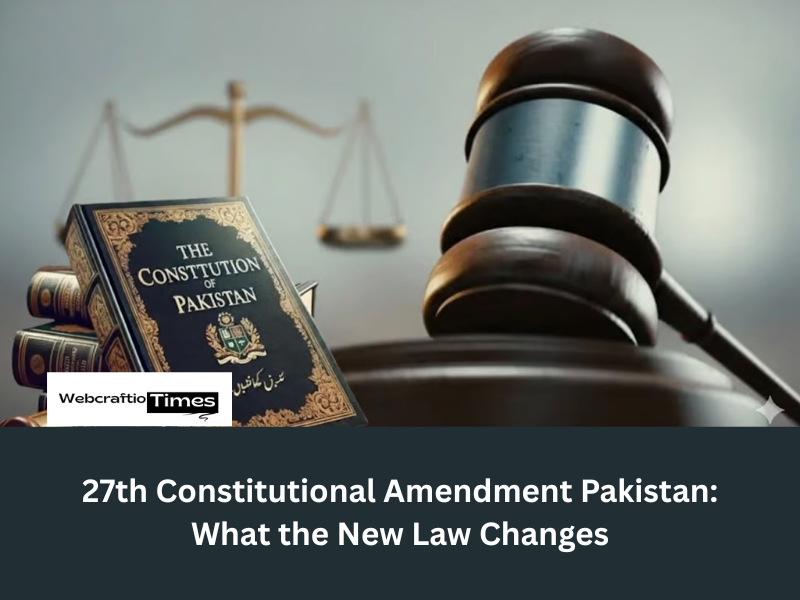The constitutional landscape of Pakistan is undergoing its most profound transformation in decades. The National Assembly and Senate recently passed the 27th Constitutional Amendment Pakistan, a sweeping bill. This amendment introduces radical changes to both the military command structure and the apex judicial system. It awaits only the President’s signature, expected immediately, to become law.
The 27th Constitutional Amendment Pakistan fundamentally reshapes the balance of power among the nation’s key institutions. These changes are substantial, touching on power, accountability, and the future of constitutional governance. Citizens must understand what the 27th Constitutional Amendment Pakistan means for their country.
Restructuring the Defence Command: New Military Power
The most immediate and controversial changes affect the Armed Forces. The 27th Amendment significantly centralizes military authority. It creates a powerful new position, enhancing the Army’s constitutional role.
The New Chief of Defence Forces (CDF) Post
This amendment officially abolishes the Chairman Joint Chiefs of Staff Committee (CJCSC) post. That post will become void effective November 27, 2025. In its place, the law establishes the new Chief of Defence Forces (CDF) position. The serving Chief of Army Staff (COAS) will hold this role concurrently.
You May Read This: Islamabad Suicide Attack: 12 Killed Outside Judicial Complex
The CDF becomes the constitutionally recognized supreme commander. This means the CDF gains clear operational authority over the Navy and the Air Force. This change formalizes the Army Chief’s existing institutional dominance. It grants the Army Chief unprecedented constitutional power over the entire defence apparatus. The government justifies this as necessary for unified command and strategic synergy.
Lifelong Immunity and Five-Star Rank
Perhaps the most contested part of the 27th Constitutional Amendment Pakistan is the provision for lifelong rank and legal immunity. The amendment constitutionally recognizes five-star ranks. These include Field Marshal, Marshal of the Air Force, and Admiral of the Fleet. These ranks become lifetime designations for their holders.
More critically, officers holding these lifetime five-star ranks gain lifelong immunity from criminal prosecution. This immunity mirrors that granted to the President under Article 248 of the Constitution. They also retain all rank, privileges, and uniforms for life. Critics argue this measure places a select group above the law. It establishes a powerful, protected, and permanent elite. Furthermore, the new law cements the Army’s control over the nuclear command. The head of the National Strategic Command must now be an Army officer. This is a key provision of the 27th Constitutional Amendment Pakistan.
The Judicial Overhaul: Creation of the FCC
The second major pillar of the 27th Constitutional Amendment Pakistan completely reconfigures the judiciary. It introduces a new top court. This dramatically alters the Supreme Court’s traditional role.
Establishment of the Federal Constitutional Court (FCC)
The amendment mandates the creation of a separate Federal Constitutional Court (FCC). This new court will assume vast judicial powers. The FCC will now solely hear all cases related to constitutional interpretation. It will also handle disputes between the federal and provincial governments.

This change significantly reduces the Supreme Court’s powers. The Supreme Court will now focus primarily on traditional civil and criminal appeals. It effectively loses its position as the ultimate constitutional arbiter. Proponents say this will speed up justice and separate the two distinct functions of the top court. Opponents argue this weakens the Supreme Court’s authority. This fundamental restructuring is a core part of the 27th Constitutional Amendment Pakistan.
Changes to High Court Judge Transfers
The 27th Amendment also addresses the transfer of High Court judges. The President can now transfer a High Court judge to another court. The President acts only on the recommendation of the Judicial Commission of Pakistan. Crucially, this transfer does not require the concerned judge’s consent.
A refusal to accept the transfer will be treated as retirement. This constitutional change gives the executive branch new leverage. Critics fear this compromises the independence of High Court judges. They view this as a potential tool for executive control. This is another controversial element within the 27th Constitutional Amendment Pakistan. The need for the 27th Constitutional Amendment Pakistan is a matter of fierce public debate.
Controversy, Rationale, and Public Reaction
The government asserts the 27th Constitutional Amendment Pakistan modernizes governance. It claims the change enhances national security and reduces judicial backlog. Supporters believe separating constitutional and appellate functions will ensure speedy justice. They claim the 27th Constitutional Amendment Pakistan will improve legal efficiency.
However, the opposition parties strongly rejected the bill. They staged a major walkout and boycotted the vote. Their key criticisms center on two areas. First, they argue the amendment undermines judicial independence by weakening the Supreme Court. Second, they contend it institutionalizes military supremacy. Granting lifelong immunity places certain powerful individuals above the law. The 27th Constitutional Amendment in Pakistan faces significant resistance.
Many fear the 27th Constitutional Amendment in Pakistan erodes democratic checks and balances. The 27th Constitutional Amendment of Pakistan changes fundamental governance. Experts are divided on the true impact of the 27th Constitutional Amendment in Pakistan. The long-term effects of the 27th Constitutional Amendment in Pakistan remain to be seen.
Conclusion: A New Constitutional Future
The passage of the 27th Constitutional Amendment Pakistan signals a defining moment. It introduces a new institutional architecture, it establishes a centralized military command under the CDF, it also creates a new judicial apex in the Federal Constitutional Court (FCC). This complex legislation will fundamentally reshape the national political landscape.
The 27th Constitutional Amendment Pakistan has passed. It will come into force quickly upon the President’s assent. All stakeholders must now grapple with the consequences. The 27th Constitutional Amendment Pakistan marks the beginning of a new constitutional chapter.
FAQs on the 27th Constitutional Amendment Pakistan
1. What is the biggest change to the military command structure?
The amendment abolishes the Chairman Joint Chiefs of Staff Committee (CJCSC) post. It creates the new Chief of Defence Forces (CDF) position, which the Chief of Army Staff (COAS) will hold concurrently. This centralizes command over all three services.
2. What special privileges does the amendment grant to five-star officers?
It grants five-star officers, such as the Field Marshal, lifelong rank and privileges. Most critically, they receive lifelong immunity from criminal prosecution, similar to the immunity given to the President.
3. How does the amendment change the judicial system?
It establishes a new Federal Constitutional Court (FCC). This new court will take over all constitutional interpretation cases and federal-provincial disputes, significantly reducing the Supreme Court’s jurisdiction to mainly civil and criminal appeals.
4. What is the controversial aspect regarding the transfer of High Court judges?
The new law allows the President to transfer a High Court judge to another court based on the Judicial Commission’s recommendation, without requiring the judge’s consent. Refusal is treated as retirement.
5. Why did opposition parties boycott the vote on this amendment?
Opposition parties boycotted the vote, arguing the amendment undermines judicial independence by weakening the Supreme Court. They also criticized it for institutionalizing military supremacy by granting lifelong immunity to senior officers.



